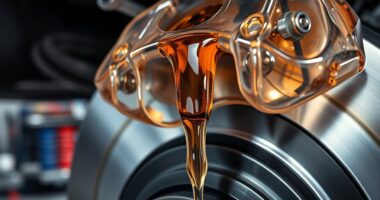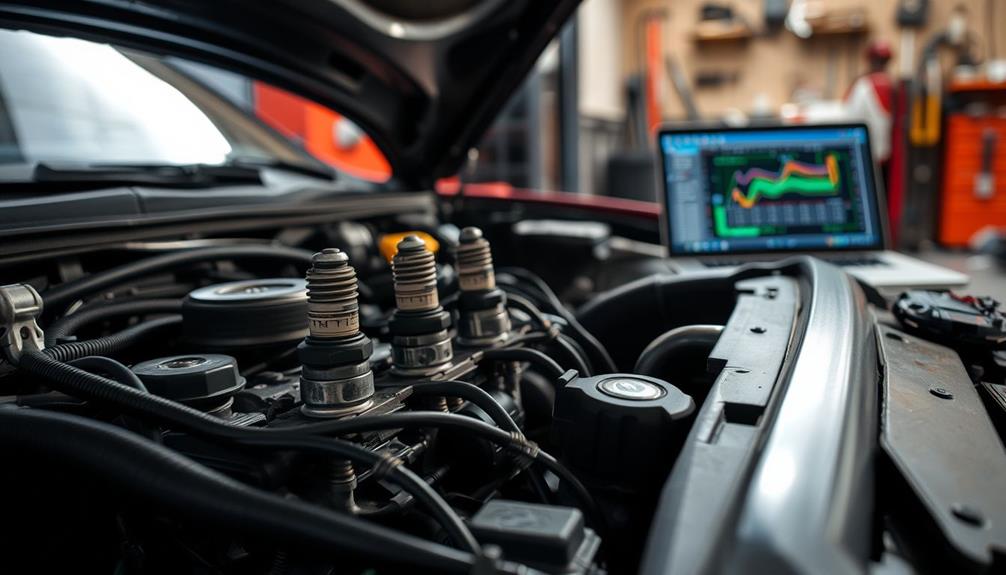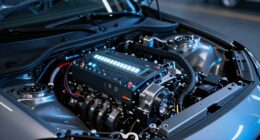To get your car tuned, start by identifying your performance goals. Choose a reputable tuning specialist who understands your vehicle's make and model. They'll help you adjust the Engine Control Unit (ECU) for improved horsepower and torque. Consider suspension modifications for better handling, and don't skip compliance with local regulations on modifications. After tuning, take your car for a test drive to assess performance changes and monitor vehicle health regularly. Engaging with car tuning communities can also offer valuable insights. Check out more tips and strategies to maximize your tuning experience! Additionally, it’s important to stay on top of regular auto maintenance tips such as oil changes, tire rotations, and brake checks to ensure that your tuned car continues to perform at its best. Keeping up with these maintenance tasks will help prolong the life of your vehicle and prevent any potential issues that may arise from the modifications. Finally, always consult with your tuning specialist or a certified mechanic if you have any concerns about the performance or health of your car.
Key Takeaways
- Research and choose a reputable tuning service with expertise in your specific vehicle make and model for optimal results.
- Discuss your performance goals and provide vehicle specifications to ensure tailored tuning files during the process.
- Understand and comply with local regulations regarding modifications to avoid potential fines and legal issues.
- Schedule regular diagnostics and maintenance to monitor vehicle health and prevent performance degradation post-tuning.
- Engage with car tuning communities for insights, advice, and updates on trends and best practices in tuning.
Understanding Car Tuning
When it comes to car tuning, what exactly does it involve? Car tuning is all about modifying your vehicle's engine and suspension to boost performance while matching your personal style.
There are various tuning options available, with one of the most vital being adjustments to the Engine Control Unit (ECU). This can greatly enhance fuel efficiency, horsepower, and torque, giving your ride that extra kick you crave.
Suspension tuning is another important aspect, focusing on improving stability and handling. Whether you choose to lower your vehicle's body or upgrade to sports suspensions, these modifications can transform your driving experience.
However, it's essential to remember that legal compliance is necessary when tuning your car. You need to verify that all modifications adhere to local regulations, including using parts that have an ABE (General Operating Permit) to avoid fines or legal issues.
If you're considering tuning, popular models like the Audi S3 and VW Golf IV Turbo offer robust options.
Engine and Suspension Modifications
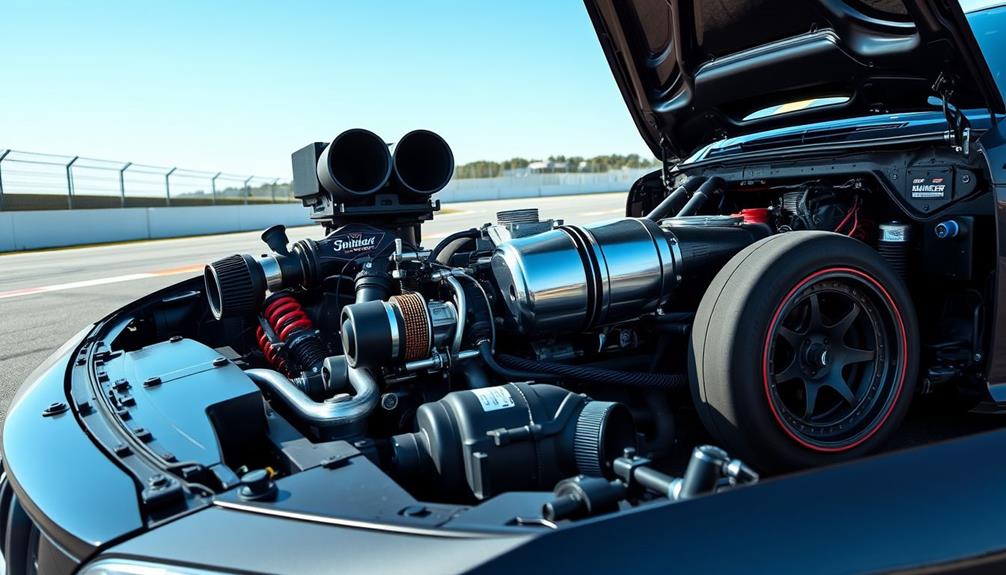
Engine and suspension modifications are essential to revealing your vehicle's full potential. By focusing on engine performance, you can markedly enhance your car's capabilities. Methods like turbocharging increase air intake, potentially boosting horsepower and torque by up to 50.
When you combine this with remapping the ECU and upgrading your exhaust system, you create a synergistic effect that maximizes your vehicle's overall performance and elevates your driving experience.
Suspension modifications are equally important. Upgrading to adjustable coilovers allows you to fine-tune ride height and firmness, improving handling and stability, especially during cornering.
Adding components like sway bars and strut tower braces reduces body roll and enhances chassis rigidity, making your car more responsive and controllable in dynamic driving situations.
Don't forget that regular alignment checks after these modifications are vital. They guarantee ideal tire contact with the road and prevent uneven tire wear, keeping your car performing at its best.
Visiting a reputable tuning workshop can guide you through these improvements, guaranteeing your engine and suspension modifications work together harmoniously for an exhilarating driving experience.
Aesthetic Enhancements

When it comes to aesthetic enhancements, custom rims and tires can transform your car's look while boosting performance.
Pairing lightweight rims with stylish tires gives your ride a unique flair and improves handling.
Don't forget about interior styling options; upgrading your seats or adding custom accents can elevate your driving experience.
Custom Rims and Tires
Custom rims and tires can transform your vehicle's appearance and performance, offering a variety of styles and finishes to match your personal taste. As a performance enthusiast, you'll appreciate how custom rims can greatly enhance both aesthetics and handling characteristics.
The choice of rim size directly affects your car's driving dynamics; larger rims typically provide better traction and durability, while smaller ones can improve acceleration.
When selecting tires, pay attention to tire sizes and tread depth. Deeper treads enhance grip and safety, especially in wet conditions, while shallower treads can boost performance on dry surfaces. It's vital to take into account how these factors work together to optimize your vehicle's performance.
However, keep in mind that legal restrictions often apply to rim and tire sizes. Ensuring compliance with local regulations is important to avoid fines or complications during vehicle inspections.
Upgrading to custom rims and tires isn't just about looks; it can greatly improve your car's handling, making it a worthwhile investment for any performance enthusiast. So, take the time to choose the right combination that fits your style and enhances your driving experience!
Interior Styling Options
Upgrading your car's interior can be just as impactful as enhancing its exterior with custom rims and tires. When considering interior styling options, start with custom upholstery. Choosing materials like leather or Alcantara can greatly enhance both comfort and aesthetic appeal.
Next, think about upgrading the steering wheel. Opting for a sportier design like a flat-bottom or racing-inspired wheel not only improves your grip but also elevates your driving experience.
Don't forget about the atmosphere inside your car. Installing ambient lighting kits lets you customize the cabin's vibe, with adjustable colors and intensities that match your mood.
If you enjoy music, consider upgrading the audio system. High-quality speakers and subwoofers can dramatically enhance sound quality, making every drive more enjoyable.
Lastly, custom gauge clusters and dashboard trims can provide a unique touch to your interior. These not only showcase your personal style but also improve visibility for important performance metrics.
Legal Considerations
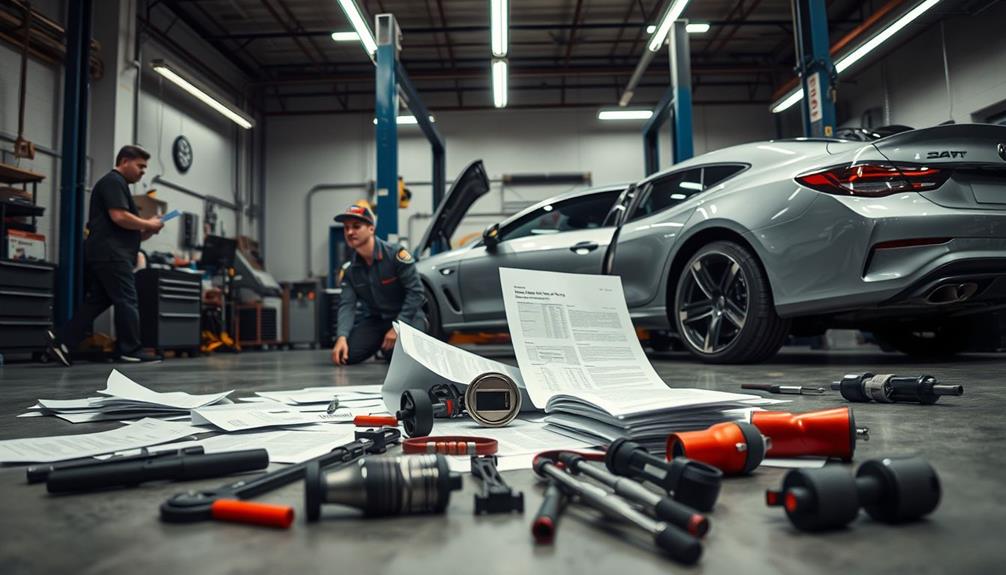
Before diving into car tuning, it's essential to understand the legal considerations that come with modifications. Each region has specific regulations that govern what you can and can't alter on your vehicle. Failing to comply with these laws can lead to fines or penalties, so you need to stay informed.
In places like Germany, for example, any parts that come with an ABE (General Operating Permit) must be documented in your vehicle. This is necessary for legal compliance.
It's also important to consult with tuning experts who can guide you in ensuring your modifications meet safety and legal standards; improper changes might jeopardize your operating license.
Don't overlook aspects like rim and tire sizes, as there can be legal restrictions on these as well. Engaging with local authorities can provide clarity on the specific legal requirements in your area.
They can help you navigate the complex landscape of vehicle modifications and avoid complications down the road. Remember, staying informed and compliant not only keeps you legal but enhances your tuning experience without the fear of repercussions.
Community and Resources
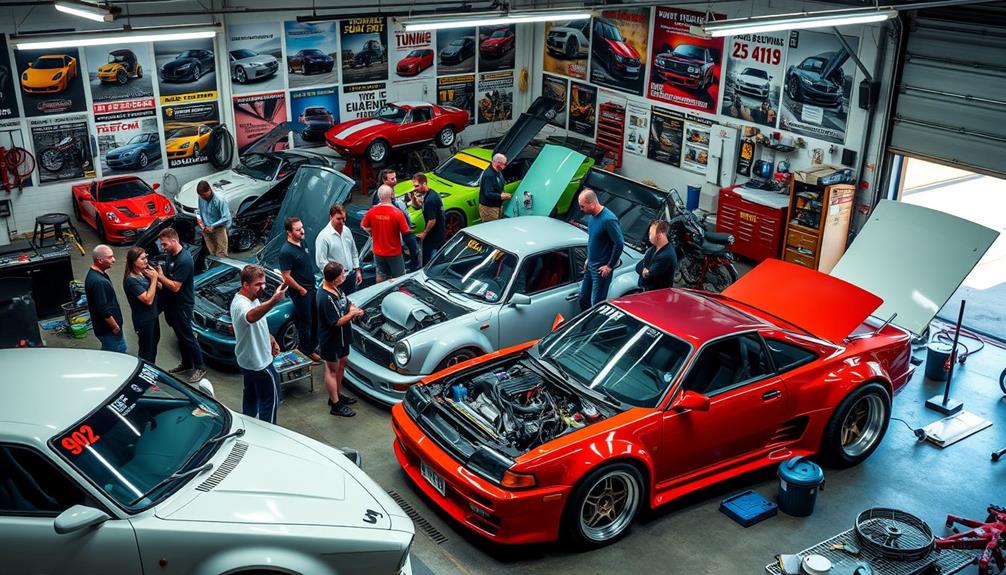
Getting involved in car tuning communities can considerably enhance your experience and knowledge. These communities, like NASIOC for Subaru enthusiasts, provide access to valuable forums where you can immerse yourself in discussions about modifications and upgrades that boost your vehicle's performance.
You'll find that many tuning forums offer advanced search options, making it easy to navigate through topics and zero in on the information you need. As you participate, you'll discover that community members are keen to share their experiences and advice. This real-world insight can help you learn best practices and avoid common pitfalls.
Engaging in community polls and discussions can also keep you in the loop about popular tuning trends and techniques. Additionally, these communities often present a wealth of resources, including FAQ sections, detailed guides, and expert tips tailored for enthusiasts like you.
Getting Started With Tuning Files

Tuning files are the key to releasing your vehicle's performance potential, allowing you to make precise adjustments to the ECU's settings. These files, often referred to as remaps, modify the ECU software to enhance various parameters, including fuel injection and turbo pressure.
To get started, research and select a reputable tuning service with a strong track record. Before diving into the tuning process, it's vital to perform a diagnostic check on your vehicle. This step helps identify any existing issues that could negatively impact performance after tuning.
Once you've chosen a service, the next step is to collaborate with tuning specialists who can tailor the tuning files to meet your specific performance goals. They'll load the file onto the ECU using specialized tools, guaranteeing the modifications align with your vehicle's capabilities.
After the installation, don't skip the test drive! It's important to verify the effectiveness of the tuning and confirm your vehicle operates at its best.
Conduct another diagnostic check post-tuning to confirm everything is functioning as it should. By following these steps, you'll be well on your way to unleashing your vehicle's full performance potential.
Frequently Asked Questions
How Much Does It Cost to Get Your Car Tuned?
Getting your car tuned can cost anywhere from a few hundred to several thousand dollars. Basic ECU remaps typically range from $300 to $1,500, while extensive upgrades can exceed $5,000, depending on your choices.
How to Tune an Engine for Performance?
To release untamed power, you'll optimize your ECU settings, adjust fuel injection, and enhance ignition timing. Get ready to feel that adrenaline rush as your engine roars with newfound strength and performance like never before!
How Can I Get the Most Performance Out of My Car?
To get the most performance out of your car, focus on specific goals, upgrade components like the exhaust and suspension, and consider ECU remapping. Regular maintenance guarantees safety and compliance, maximizing your driving experience.
Does Tuning a Car Decrease Reliability?
Yes, tuning a car can decrease reliability. It might stress engine components and lead to wear if not done properly. Always guarantee quality parts and regular maintenance to maintain performance without compromising your vehicle's longevity.
Conclusion
Tuning your car might seem intimidating, but it's all about enhancing your driving experience and personalizing your ride. You don't need to be a mechanic to get started—just follow the guide, and you'll be on your way to a more powerful, stylish vehicle. Plus, joining a community of fellow enthusiasts can make the journey even more enjoyable. So, plunge into it and embrace the excitement of tuning; you'll be glad you did!


